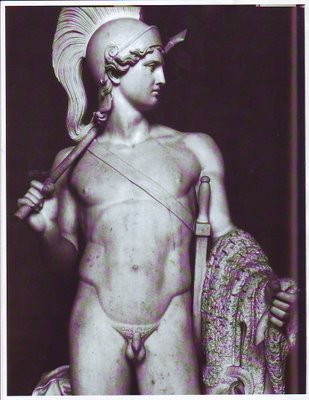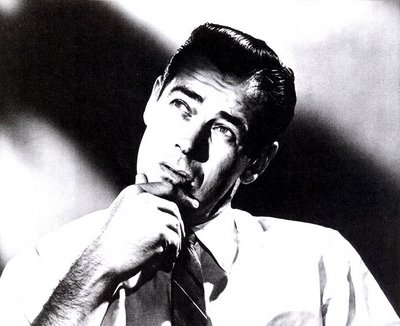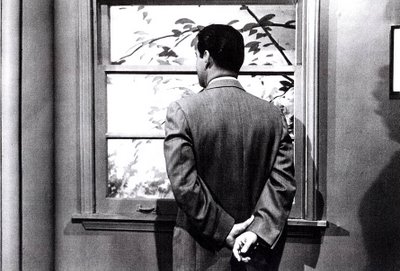 Actually I do like Nietzche in the sense of having affectionate feelings for him, I just don't buy into a word of what he says. I'm always amazed when fans of his tell me that they felt liberated after reading him. Nietzche had no intention of liberating people like them. He would have been appalled at the thought! His desire was to subordinate them to a new master, the superman.
Actually I do like Nietzche in the sense of having affectionate feelings for him, I just don't buy into a word of what he says. I'm always amazed when fans of his tell me that they felt liberated after reading him. Nietzche had no intention of liberating people like them. He would have been appalled at the thought! His desire was to subordinate them to a new master, the superman.I hate to say it, but Nietzche was not a nice guy. He was reputedly nice to his students and friends and some of his writings have an appealing quality, but when it came to content he was able to steel himself to astonishing harshness. He didn't care who got hurt. His philosophy seemed to be, you can't make an omelet without breaking eggs.
 Of course the National Socialists loved Nietzche, in fact it's hard to imagine nazism without Nietzche. Fans like to say that his name was hijacked by thugs who didn't understand him, but I think they understood him surprisingly well. If you read what Nietzche actually said you see dozens of parallels with the kind of things that came out of Germany in the 30s. I don't think Nietzche would have approved of Hitler or the Holocaust but that doesn't let him off the hook. The spirit ofNational Socialism owed a lot to Nietzche and it's silly to ignore that.
Of course the National Socialists loved Nietzche, in fact it's hard to imagine nazism without Nietzche. Fans like to say that his name was hijacked by thugs who didn't understand him, but I think they understood him surprisingly well. If you read what Nietzche actually said you see dozens of parallels with the kind of things that came out of Germany in the 30s. I don't think Nietzche would have approved of Hitler or the Holocaust but that doesn't let him off the hook. The spirit ofNational Socialism owed a lot to Nietzche and it's silly to ignore that. One of the reasons Nietzche is so hotly debated is that his opinions are so hard to pin down. He's both mild and harsh in the same book, sometimes in the same paragraph. Nice guy, hard guy...it depends which sentense you're reading. It's well known that he was clinically crazy later in life but, reading him, it's hard to resist the notion that he was skewered even in mid-life. He had tons of literary talent but it's hard to imagine that he was ever taken seriously as a philosopher.
One of the reasons Nietzche is so hotly debated is that his opinions are so hard to pin down. He's both mild and harsh in the same book, sometimes in the same paragraph. Nice guy, hard guy...it depends which sentense you're reading. It's well known that he was clinically crazy later in life but, reading him, it's hard to resist the notion that he was skewered even in mid-life. He had tons of literary talent but it's hard to imagine that he was ever taken seriously as a philosopher. The other guy that I don't like is Machievelli. He looks like such a sweet guy in the portrait above, but he was anything but sweet in "The Prince, " which is a truly disturbing book.
The other guy that I don't like is Machievelli. He looks like such a sweet guy in the portrait above, but he was anything but sweet in "The Prince, " which is a truly disturbing book.
I'm familiar with the argument that he was the founder of modern political science and was simply trying to save his city from ruin. It doesn't wash. We already had political science written by the Greeks and Romans. Machievelli simply added venality to it. As for the city falling apart, you wonder if the cure was worse than the disease.
The harm might have been contained if only a handfull of princes had the book but the printing press made it accessable to everyone. All of a sudden lots of ordinary people were wondering if they should fight dirty to get what they wanted. People who stuck to traditional ideals of honesty and charity must have found themselves wondering if they were patsies. I like the modern world but it has an undeniable coarse and abrasive tone to it. Machiavelli's one of the people responsible for that.

 Fernandel: Hey, you guys like Greek philosophy don't you? Good, so do I!
Fernandel: Hey, you guys like Greek philosophy don't you? Good, so do I!
 That's because Greek philosophy, which shaped the way we make arguments, never devoted much time to the defense side. The Greek philosophers arose during a time of change in Greece and their job was to pave the way for that change by attacking the establishment. The poor establishment never got it's share of philosophy.
That's because Greek philosophy, which shaped the way we make arguments, never devoted much time to the defense side. The Greek philosophers arose during a time of change in Greece and their job was to pave the way for that change by attacking the establishment. The poor establishment never got it's share of philosophy. The best the Greeks could do for the defense side was to come up with rhetoric and oratory. Rhetoric teaches the arguer to flatter the audience and establish himself as a likable and trustworthy speaker. He's saying, in effect, "If you like me then you should like my argument. Trust me. "
The best the Greeks could do for the defense side was to come up with rhetoric and oratory. Rhetoric teaches the arguer to flatter the audience and establish himself as a likable and trustworthy speaker. He's saying, in effect, "If you like me then you should like my argument. Trust me. " Actually the Greeks came up with another way to argue for the defense. That way was to limit the people debating to the landowners. The thinking was that people who had a financial stake in stability and tradition could be trusted not to carry attack arguments too far.
Actually the Greeks came up with another way to argue for the defense. That way was to limit the people debating to the landowners. The thinking was that people who had a financial stake in stability and tradition could be trusted not to carry attack arguments too far. 











